Karen Selick is a lawyer with the Canadian Constitution Foundation. If you love food freedom please donate to the Canadian Constitution Foundation.
For more information about raw milk and food freedom please see Food Freedom: The Politics of Food.

Karen Selick is a lawyer with the Canadian Constitution Foundation. If you love food freedom please donate to the Canadian Constitution Foundation.
For more information about raw milk and food freedom please see Food Freedom: The Politics of Food.
“Fireweed removes anger and transmutes karma. It is the remedy of restoration. When life destroys us, Fireweed flower essence helps us to successfully start over. Like the Phoenix rising from the ashes of the fire, it helps you to connect to your Higher Self and encourage spiritual breakthroughs. With this comes renewed passion, discovering what your purpose in life is. What you are doing has importance and needs to be done.”
Wild Rose College of Natural Healing
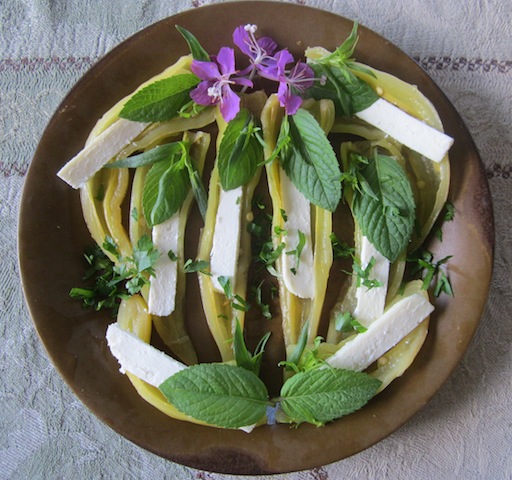
I just had to share my “health hazard” appetizer, topped with black-market cheese. The Fireweed is for transmuting my anger into a spiritual breakthrough. Think it’s working?
WARNING: This post is a piece of humorous fiction and should not be read as a statement of truth.
We enjoyed our Canada Day Feast beginning with a Black-Market Cheese Appetizer, followed by an illegally produced fermented meat called Sopressata. All washed down with black-market raw milk. The main course was uninspected beef ? killed without appropriate permits ? with a bone broth gravy made from industrial organic shiitakes. The vegetable medley was from unwashed garden vegetables grown in humanure! Dessert was wild strawberries collected by a Metis person without a harvesting licence and without the appropriate paperwork being filed!
We finished off our meal with a snort of moonshine, followed by an after-dinner smoke of medical marijuana?produced by a unregistered grower! The smoke helped with my depression over the fact that “everything I want to do is illegal.”
Every year that passes, it seems easier to find oneself on the wrong side of the law.
Happy Frickin’ Canada Day!
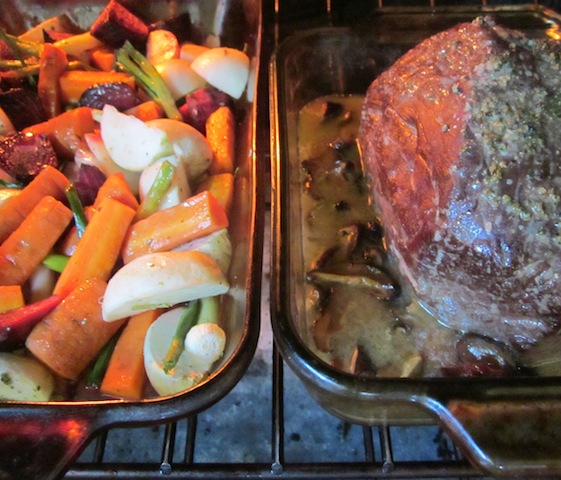
In a free country, artisan foods should not be hard to get. Nor should growing or keeping animals for household use be illegal. Farmers shouldn’t be running scare from government enforcers.
If you love food freedom consider donating to the Canadian Constitution Foundation. You don’t even have to cut your hair. Just send the money!
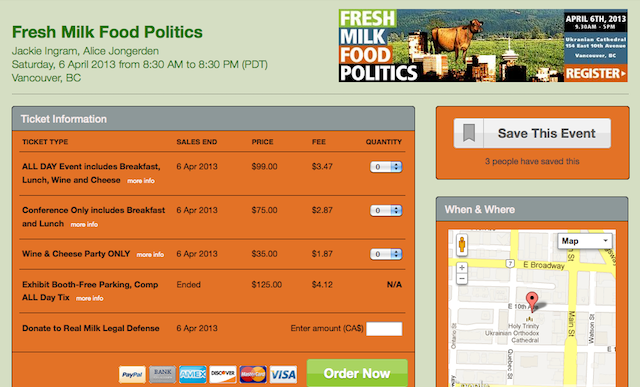
If you value the freedom to choose the kinds of foods on your table please come to Fresh Milk, Food Politics in Vancouver, BC.
When: April 6, 2013
Time: 8:30am-8:30pm
Where: Ukrainian Cathedral, 154 East 10th Ave, Vancouver, BC, V5T 3E5
Cost: $99.00
Buy Tickets Here: Fresh Milk, Food Politics
Jackie Ingram and Alice Jongerden of Home On The Range invite you to Fresh Milk, Food Politics. “Please join us for a day of networking, activism and food politics. Dynamic speakers and food exhibits, followed by a wonderful local cheese and wine party to end the day!”
I will be running an information table for the Weston A Price Foundation. Please come and meet the people trying to ensure that you can have the food you want on your plate. If you would like to have some background history about raw milk and food freedom please read: Food Freedom: The Politics of Food.
Updated April 11, 2013: I wanted to share some pictures from Fresh Milk, Food Politics. Apparently, there will be videos of the lectures on the website soon. There were two lectures that I found particularly interesting. Karen Selick from the Canadian Constitution Foundation lectured on how the government uses children to restrict personal freedoms and Nadine Ijaz from the Pacific Rim College outlined the science behind the myths and truths around raw milk.
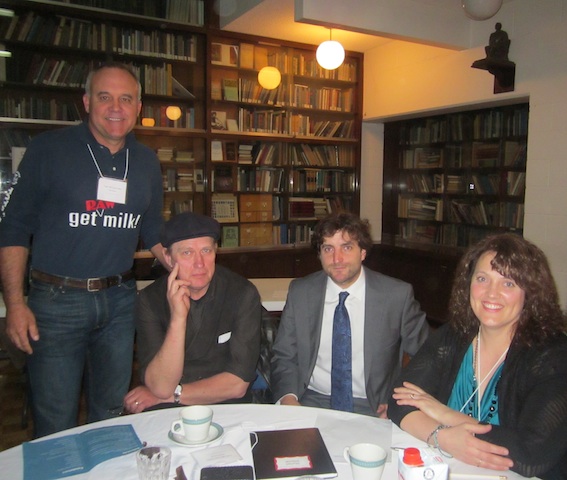
From the left are Mark McAfee, Micheal Schmidt, Jason Grati and Alice Jongerden. These are the people who are fighting for your food freedom.
Mark McAfee from Organic Pastures runs the largest raw milk dairy in California. In California you can buy raw milk in stores. Micheal Schmidt is from Glencolton Farm in Ontario. Michael has been fighting the government for nearly twenty years for the right of herdshare owners to drink milk from their own herd. Jason Gratl is the lawyer for Alice Jongerden from Home on the Range. Alice runs Canada’s largest herdshare program.
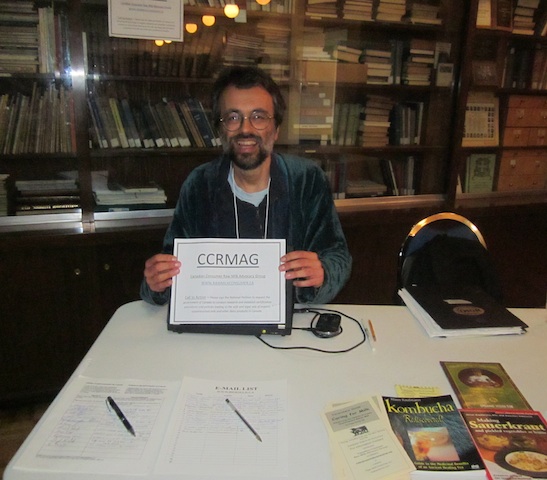
This is Raoul Bedi with the Canadian Consumer Raw Milk Advocacy Group getting signatures to petition the government for raw milk sales in Canada.
Canadian Consumer Raw Milk Advocacy Group
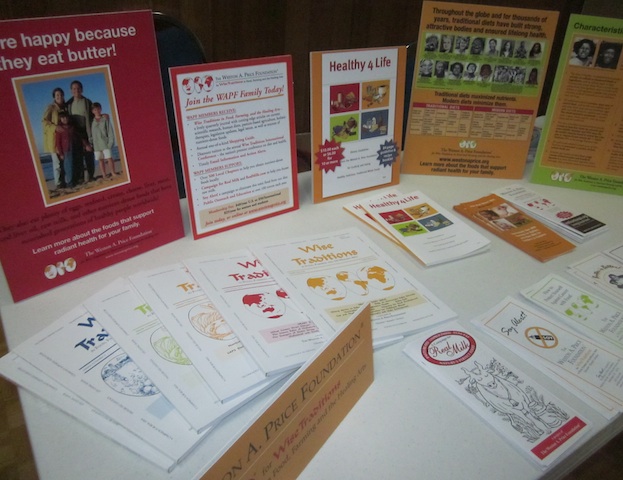
The Weston A Price Kamloops Chapter was an exhibitor. It was great to meet all the people working — and sacrificing — to keep nourishing traditional foods on everyone’s table.
Updated April 19, 2013: Here are just two short interviews with Karen Selick and Nadine Ijaz. There are many more interviews from Fresh Milk, Food Politics.
As I was making dinner last night, I heard on CBC Radio that the public hearings regarding the Enbridge Northern Gateway Project in Kelowna, BC will no longer be open to the public. Did I hear that right?
A public hearing not open to the public? Yes, I had heard correctly. Kelowna isn’t the first city to have its public hearings closed to the public. The officials are worried about safety. I guess the public’s halitosis regarding Enbridge is so toxic they are afraid the delicate constitutions on the Joint Review Panel will be offended.
So, what’s that got to do with food? Well, not very much. But it’s a sign, telling us how our government officials and elected members of parliament view public scrutiny. You can see by their actions, they are in love with this project! My shock over dinner got me to pull out this old post about food freedom, or the lack thereof. Learn and weep, as I have.
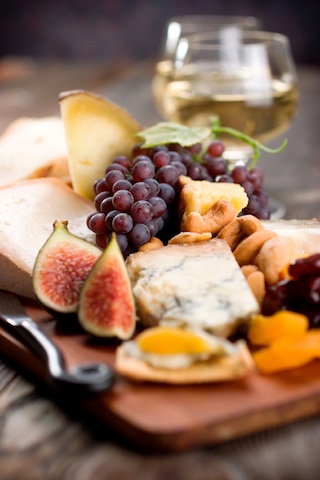
Food safety regulations are making it harder and harder for small producers to sell their products to the public. We are losing our traditional artisan processing methods in the name of food safety.
“Social libertarianism maintains that laws banning victimless acts have no rational or moral reason for existing, so they should be abolished. It also asserts that the harm caused by the prevention or prosecution of these activities is often far greater than any harm caused by the activities themselves, and would justify repeal of these laws on the same harm reduction grounds that were originally used to justify them.”
Wikipedia on Victimless Crime
When I first started this blog I never thought I would be talking so much about the politics of food. I had no idea of the powerful forces that control the food system. I never realized that farmers and ranchers face economic forces beyond their control. These forces make farmers discourage their children from farming and — in the end — the farmers give up and leave the land. As consumers, we are making choices every day about our food that will promote or slow this process.
The politics of food is about who is in control of your food supply. Unless you grow your own food, I can tell you right now, it isn’t you. Food politics could be about any food or food processing methods, but over the last few years I have closely watched the raw milk issue here in Canada.
Raw milk has become the whipping-boy for all food safety issues. I’ve had an education about the distribution of information and disinformation by following this one issue. I have become very disappointed with the mainstream media not getting the facts straight. Nor does the media stay with an issue long enough to really educate citizens about issues that will have far reaching implications.
I am not a disinterested person. I have my own cow and I want to drink her milk. At a minimum I want to maintain the legal right to drink raw milk and share it with my family members. I am concerned that it is written in BC law that raw milk is a “health hazard”. But what about people that want raw milk but don’t have appropriately zoned land or the skills to care for dairy animals? Are these people just fat out of luck? I’ve had people beg me to sell them raw milk. Should I continue to say no or become a lawbreaker?
I would feel better if government officials would stop pursuing cowshare or herdshare programs in the courts. Cowshare and herdshare programs are a way to cooperatively own a cow or herd so the owners can get a product not available for sale in Canada. I don’t understand why officials won’t allow individuals to contract directly with farmers. I can’t understand why the officials think they have a mandate to control this type of private contractual agreement. Furthermore, cowshare and herdshare programs are complicated for the farmer and expensive for the owners. These programs only involve a few thousand families in Canada and are a closed system, making them very safe. I resent that my tax dollars are going towards criminalizing and beggaring my farming friends. Doesn’t my society have better uses for tax dollars than dragging farmers through the courts for a victimless crime?
Over the years, I have pondered why the government even gives a damn about what my family chooses to drink. Is it their business what I have on my table? Apparently, it matters very much. The only answer that makes any sense to me is that the Canadian government has a monopoly on dairy production and sells quota — at a very dear price — to farmers.?This issue isn’t about food safety, its about the Government of Canada protecting its monopoly on milk quota. It’s about money and control, plain and simple.
The Government of Canada also promotes misinformation about raw milk, which is picked up and used by the mainstream media. The government uses tax dollars to criminalize and beggar people trying to help their neighbors acquire raw milk. Shame on you Government of Canada. The government’s deceit will become known and laws will be passed to stop the government from meddling in the households of the country.
Below is an index of my process of learning about the politics of food over the last few years. Most of the posts are about the raw milk issue in Canada. There is some information about regulations regarding slaughtering and supplements. There is some information about disturbing new trends involving regulations that would stop homemade treats being sold at school bake sales and how the government would like to control what’s in a homemade lunch your child eats at school.
Thomas Jefferson once said: “If people let the government decide what foods they eat and what medicines they take, their bodies will soon be in as sorry a state as are the souls of those who live under tyranny.” No government — regardless of how well intentioned — should have this kind of control over my household decisions.
Raw Milk
Let’s Talk About Raw Milk Safety
Raw Milk Contamination?
Michael Schmidt, Raw Milk Activist, Acquittal!
Canadian Government Appeals Michael Schmidt’s Acquittal
BC Supreme Court Gives Injunction Against Raw Milk
Speak Softly and Carry a Big Stick
Helping Michael Schmidt, Raw Milk Activist
Ontario Court Reverses Lower Court Decision for Raw Milk Farmer Michael Schmidt
Call to Action: Raw Milk and Food Freedom
Weston A Price Foundation Urgent Raw Milk Action Alert
Michael Schmidt Ends 37 Days of Hunger Strike!
Why do we love slavery?
Sallon Fallon on Nourishing Tradition Foods
Sally Fallon on Raw Milk
Extended Interview with Sally Fallon
Concentrated Animal Feeding Operation (CAFO)
Homegrown Revolution
Slaughtering Regulation
Slaughtering in BC: Information You Need to Know
Regulations and Farmers
Everything I Want To Do Is Illegal
School Bake Sales and Homemade Lunches
School Food Fight
Funny Troubles
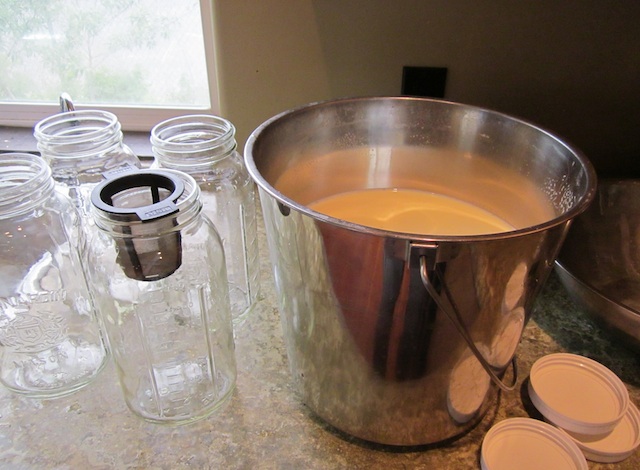
I have just removed the lid from the milking pail. Shaen was working in the pasture and the milk pail was chilled before I got it. I have organized the 2L mason jars. You can see the metal coffee filter that we use for filtering milk.
I have had a number of people ask me how we process milk and eggs at home. Most of the specialized equipment we use would be found in a traditional household. These items include glass mason jars, plastic lids, stainless steel pails, stainless steel milk pail lid, coffee filter and recycled egg cartons.
We do not use any industrial equipment such as milking machines, commercial dishwashers, separators or filtering machines. We use a metal coffee filter for filtering the milk. We wash up the equipment in our kitchen sink and process farm products on the kitchen counter. I hope these pictures will help describe the process better than an essay on the topic.
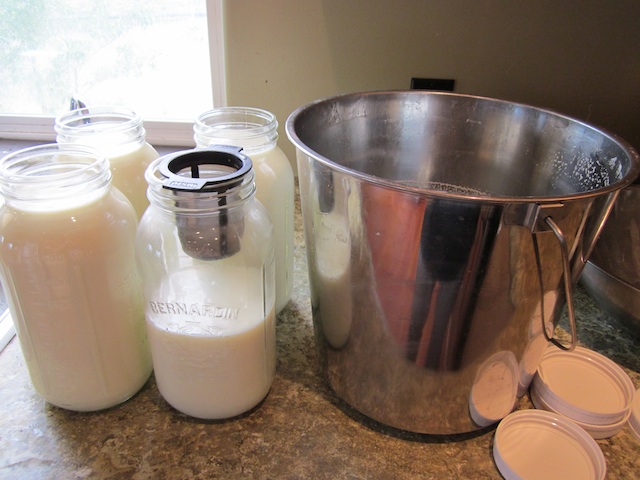
I have filtered the milk using the metal coffee filter by carefully pouring from the pail into the mason jars. I have only 7L of milk so I will transfer the milk into a 1L mason jar.
Shaen milks our cow by hand into a stainless steel pail. After milking Shaen covers the milk with a lid, to avoid stuff dropping into the milk. If Shaen has to work in the pasture after milking, he will quick-chill the milk pail by using running well water in a bucket large enough to take the milk pail. When Shaen returns with the milk I will take the milk pail and process the milk on the kitchen counter.
I organize the needed number of clean and dry 2L and 1L mason jars. I have a small metal coffee filter that sits on the top of the mason jar. I carefully pour the milk though the filter into each mason jar. I then screw on a plastic lid. I prefer plastic lids because they are easier to clean; I keep my canning lids for canning. I then date the top of each milk jar. The milk is quickly transferred to a fridge for cooling. I wash the pail and coffee filter in the kitchen sink. I let both air dry in the dish rack.
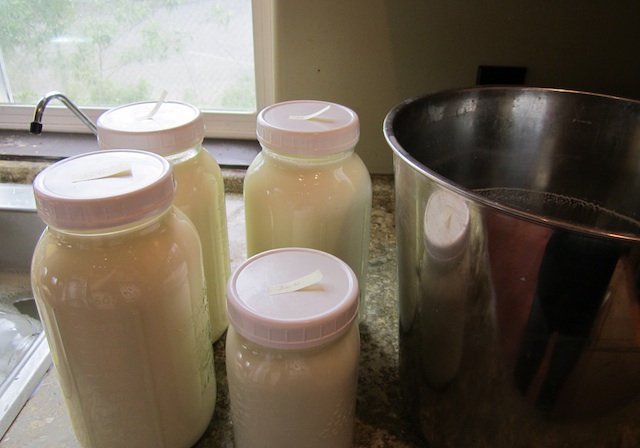
I prefer the plastic lids because they are easier to clean. I feel comfortable with plastic lids because the plastic in not in contact with the milk. I have dated the milk and will immediately transfer the milk to the fridge.
After I finish the milk, I start on the eggs. Shaen keeps all the eggs from the day before up in the pasture shed so I only have have to clean eggs once a day. If the eggs are really clean I will not wash them. Normally, I have to wash the eggs.
I put them in some warm, soapy water in the kitchen sink. I carefully wash away any grime. I rinse each egg under a stream of clean water. I set the washed eggs into the lid of the egg carton to dry. Any rejected eggs go to feed the hogs or I will break them into a bowl for breakfast.
After the eggs dry, I set them in the egg carton with the pointy end down. It is reported to make the eggs last longer. I carefully wash out my kitchen sink and make breakfast. So far we have not gotten sick from cleaning barnyard products in our kitchen.
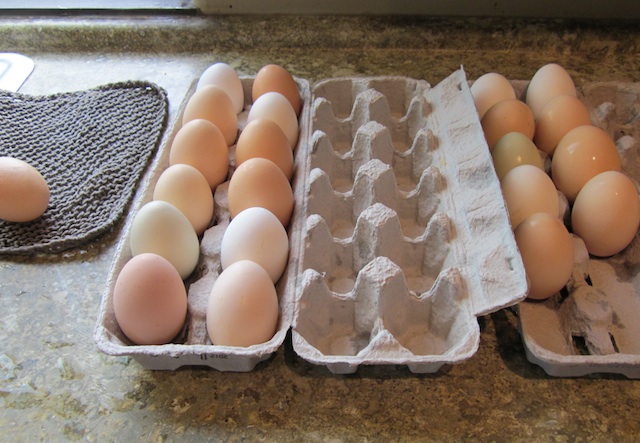
These are eggs drying in the lid of the egg carton. The rejected eggs will be used for this morning's breakfast.